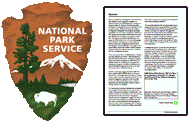United States National Park Service

United States National Park Service: Publications
Date of this Version
3-2020
Citation
Natural Resource Report NPS/HTLN/NRR 2020/2090 / NPS 031/167212, March 2020, v, 13 pages
Editing and design by Tani Hubbard
Published by the United States Department of the Interior, National Park Service, Natural Resource Stewardship and Science, Fort Collins, Colorado
Also available at: https://www.nps.gov/im/htln/index.htm
https://www.nps.gov/im/publication-series.htm
Please cite this publication as:
Young, C. C. 2020. Problematic plant monitoring in Tallgrass Prairie National Preserve: 2006–2018. Natural Resource Report NPS/HTLN/NRR—2020/2090. National Park Service, Fort Collins, Colorado.
Abstract
Abstract
Managers are challenged with the impact of problematic plants, including exotic, invasive, and pest plant species. Information on the abundance, distribution, and location of these plants is essential for developing risk-based approaches to managing these species. Based on surveys conducted in 2006, 2010, 2014, and 2018, Heartland Inventory and Monitoring Network staff and contractors identified a cumulative total of 33 problematic plant species in Tallgrass Prairie National Preserve. Of the 27 species found in 2018, we characterized 14 as very low frequency, 9 as low frequency, 4 as medium frequency, and 0 as high frequency. Only 4 (14.8%) of these species exceeded a 10-acre threshold. Smooth brome, widely planted in the bottomland prairies, is by far the most abundant problematic plant on the preserve. We recommend that preserve staff continue efforts to control the spread of old world bluestems and sericea in prairie to prevent further spread.
Included in
Environmental Education Commons, Environmental Policy Commons, Environmental Studies Commons, Fire Science and Firefighting Commons, Leisure Studies Commons, Natural Resource Economics Commons, Natural Resources Management and Policy Commons, Nature and Society Relations Commons, Other Environmental Sciences Commons, Physical and Environmental Geography Commons, Public Administration Commons, Recreation, Parks and Tourism Administration Commons


Comments
United States government work. Public domain material.